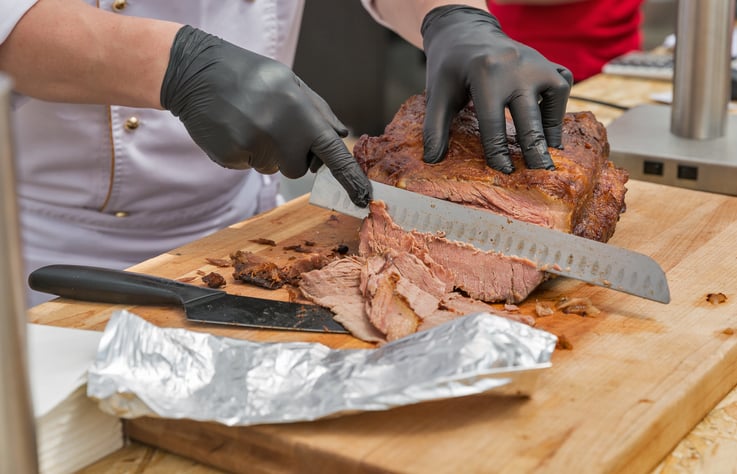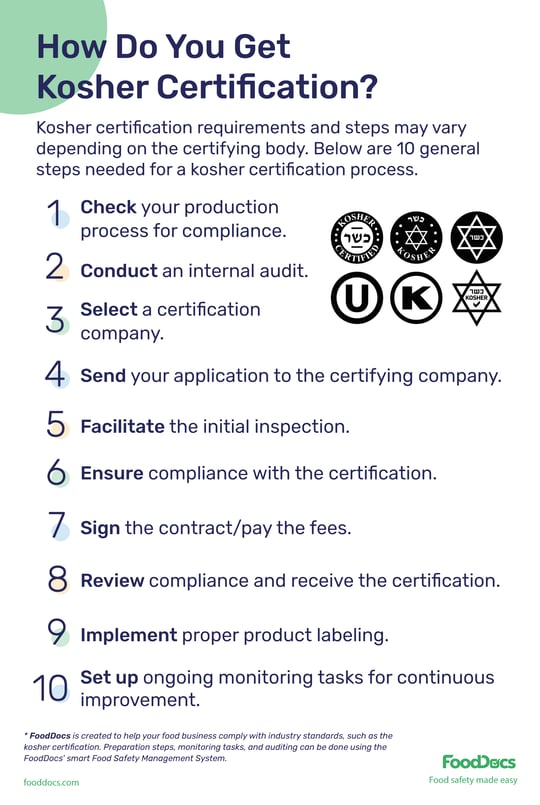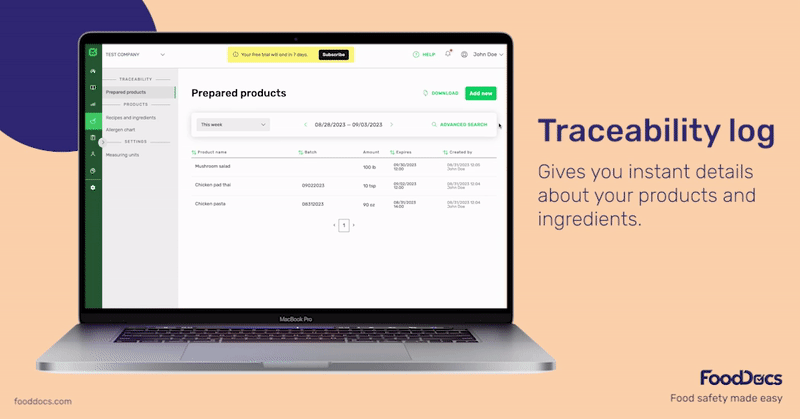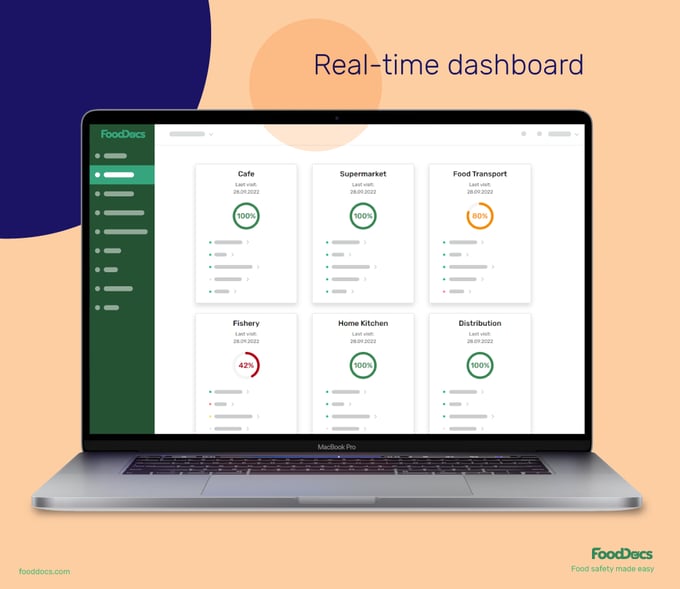Mastering Restaurant Sanitizing: Best Practices for Kitchens and Dining Areas
Master restaurant sanitizing with clear steps for kitchens and dining areas. Learn methods, checklists, and procedures to keep your team safe and...
Kosher certification ensures consumers that their products comply with their specific religious dietary requirements.
Kosher isn’t a style of cooking. It’s a culinary custom and religious practice that dates back thousands of years.
The custom goes beyond the ingredients and includes the equipment, facilities, and utensils used in the entire production process. This requires companies looking to produce kosher food to get certifications that ensure their products align with kosher standards.
But how do you get kosher certified and serve respectable food? What does the process look like? Let’s find out.
WHAT WE'LL COVER:
The term “kosher” means “proper” or “fit” in Hebrew and describes the types of solid food or beverages a Jewish person can eat according to the kashrut, the Jewish dietary law. It implies that the food consumed is:

Kosher laws help Jewish people ensure their food conforms to the Kosher terms laid out in the Torah and is needed in the market for spiritual reasons.
Importantly, blessings recited over meals by Jewish people do not make the food kosher.
For the purposes of kashrut, food must meet a set of regulations outlined in the Torah — which rabbis further interpret to accommodate contemporary contexts — to be labeled “kosher.”
It also has to be under the oversight of a trained mashgiach. They ensure that all food preparation aligns with all established guidelines. Some of the kashrut rules include:
Additional rules involve never serving or eating meat at the same time as dairy, keeping all equipment and utensils to work with meat and dairy separately, and waiting one to six hours to eat dairy after consuming meat.
Moreover, maintaining the integrity of kosher food requires strict measures to prevent cross-contamination with non-kosher items or utensils that have come into contact with unkosher substances. Many kosher kitchens also use separate stoves for kosher foods.
In this regard, FoodDocs offers monitoring tasks and checklists that your team can use to keep kosher and non-kosher kitchen items separate. Use FoodDocs' AI-powered solutions that can automatically generate key monitoring tasks to ensure that no cross-contamination occurs in your kosher processing.
Kosher products are food types and beverages that meet the rules of Jewish dietary law and contain kosher-sensitive ingredients. They have three main types:
Each food type and beverage has to meet specific rules to be certified “kosher” under Jewish law. This is ensured by independent kosher certification bodies, which will be discussed later in the article.
There are no levels of kosher on its own. However, there are different levels of how strictly people observe kosher practices.
Some are more relaxed and may eat certain foods that may be non-kosher-certified. This comes with risks, as there's a chance that non-kosher items might contaminate things that are originally kosher.
However, other people may uphold a very strict standard of kosher observance, only purchasing kosher-certified products. This is often practiced in a kosher household.
Many kosher rules focus on how animal-based foods are slaughtered and prepared. Let’s understand which types of food are labeled as kosher.
In the Torah, it's mentioned that kosher mammals are the ones that have cloven hooves and chew their cud (ruminants). These include:
Animals not classified as kosher include camels, kangaroos, horses, pigs, rabbits, and squirrels. Jewish dietary law also forbids the consumption of an entire animal. For example, an animal product made from specific cuts of beef from the hind quarters, such as flank, round, shank, short loin, or sirloin, will be considered a non-kosher dish.
Aside from that, the Torah identifies 24 species of fowl as forbidden, considering all other birds to be kosher. However, in practice, people consume only those birds with a well-established kosher tradition. These include:
Any food made from or containing milk falls into the dairy category, which includes milk, butter, yogurt, and all types of soft/hard/cream cheese. Even a tiny amount of dairy can categorize a food item as dairy.
For dairy products to be called kosher, they must meet the following criteria:

Pareve are food items that fall outside the categories of meat and dairy. They include candies and snacks, coffee, eggs, fish, fruit, grains, pasta, soft drinks, tea, unprocessed juices, and vegetables.
While pareve foods are less complex to deal with than meat or dairy, it's important to keep an eye on the following:
Finally, pareve foods can lose their kosher status if processed on equipment used for meat or dairy — or if additives are introduced.
Every kosher food item and beverage is marked with a hechsher, a Kashrut symbol that shows the product meets kashrut laws. However, these symbols vary since each certifying agency has a different symbol.
Common kosher symbols include a star inside a circle (Star-K), a "K" inside a circle (OK Kosher), and a "U" inside a circle (Orthodox Union).
![]()
Certain kosher symbols are considered unreliable due to the training, credentials, or personal religious practices of the company creating them. These include:
However, it’s important to note that some products marked with a "K" are under reliable supervision, such as Kellogg's cereal.
Kosher certification is an official endorsement given by certifying agencies that are responsible for inspecting and overseeing food production processes to ensure they meet kosher standards.
This certification may be required by the following businesses:
A kosher certificate confirms that a product has undergone thorough checking and monitoring following kosher laws. It also informs customers about specific kosher categories the product may fall under, such as meat, dairy, or Passover status.
FoodDocs' smart Food Safety Management System helps companies achieve kosher status by offering monitoring tasks to prevent cross-contamination between kosher and non-kosher items, food traceability to ensure all ingredients are kosher, and a real-time dashboard to maintain food safety (which is a requirement for kosher certification).
Kosher-certified means that a qualified Rabbinic organization has overseen a food item's production to ensure it complies with Jewish dietary laws. It focuses on two key areas:
A trained rabbinic field representative also conducts unannounced visits to the company’s production site regularly to verify that no changes have occurred that could compromise its kosher status.
There are different types of kosher certifications, each signifying a different level of kosher law implementation.
Current kosher certifications are divided into the following categories:
Moreover, there are over 1,100 kosher certification organizations in the world. However, in the US, five of the largest agencies certify more than 80% of the kosher food sold in markets. They are known for reliable kosher certification and include the following:
Considered the gold standard of kosher certification, OUK certifies about 70% of kosher food worldwide. The company uses symbols for product certification, such as:
As of 2019, OUK certifies almost one million products produced by 12,000 companies in 104 countries.
Kof-K certifies over 300,000 products that are produced by 4,000+ companies like Pepsi, Unilever, and Kerry every year. It also gives certifications to eateries in the US.
Star-K certifies tens of thousands of food items and beverages around the world every year. It is trusted by Orthodox Jews.
Aside from the standard kosher certification, the organization also provides a Star-D certification that helps customers ensure a milk product is produced under Rabbinic supervision.
It also gives access to the Start-S certification label, which ensures that food items with kitniyot ingredients are safe for Passover.
CRC is a non-profit kosher transportation and trucking certifier that also grants letters of kosher certification to thousands of food companies every year.
Which agency you choose depends on your preference. But all of them have more or less the same requirements for certification. Let's check these requirements out in the next section.
Since the kosher certification industry is self-regulated, certification requirements vary from organization to organization. Moreover, every manufacturer and company has unique specifications, which means unique kosher solutions.
For instance, the kosher certification process for a restaurant or caterer will be different than that of a manufacturer. This is why there isn’t a single list of requirements for getting kosher-certified.
However, companies can increase their chances of getting certified by meeting the following general requirements:
Companies can look at a flow chart that describes their production process to make sure they meet the kosher-certification criteria.
Getting kosher-certified requires you to consider every ingredient in your product, your contract manufacturer's production process, and how you’re selling your product before you can ever get certified.
Let’s understand how you can do that and get a kosher certification: 
Before starting the kosher certification process, you should check your production line for kosher compliance. This includes understanding the kosher process, meeting basic kashruth requirements like preventing dairy-to-meat use of utensils, using kosher ingredients, and serving meat from allowed animals. It's also important to understand the details of kashrut and kosher slaughter, such as the proper time of slaughter and the use of kosher slaughterers.
However, if you find it difficult to understand which requirements you should adhere to, make sure your production process is following general food sanitation and food safety practices.
To ensure your product process is kosher-compliant, it might be a good idea to conduct an internal audit of your company. This step involves a thorough review of your production processes, ingredient sourcing, employee training, and overall adherence to kosher principles. It's essential to identify and rectify any areas that may not comply with kosher standards. This self-assessment ensures that you are well-prepared for the external auditing process.
The next step is to choose a certification company. This may require contacting representatives or scheduling consultations to understand which company is a better partner for you.
For instance, if you have a private-label product that is produced once every year, you may only need to re-kasher your equipment at that time. This may require you to go with a company that covers private labels.
However, if your production line produces kosher products and non-kosher on alternate days, you will require re-kashering every other day. Many audit agencies may balk at providing this service, so you’d have to find one that does.
After your consultation, send the kosher certification application to your chosen auditor. You can do this by mail, online, or fax, depending on your choice. However, before doing that, make sure your application includes the following information and documents:
All of these documents will help ensure that your application is processed as quickly as possible.
Once your application has been received, a field representative or auditor will visit your facility. They’ll review your production line, supply chain, and general premises to ensure they comply with Jewish dietary practices.
After they have performed the audit, the representative will file a written report to the headquarters.
A senior rabbinic coordinator will review your inspection report to ensure it complies with the kashruth. If any issues pop up, they’ll let you know what changes you need to make to apply for successful certification.
Once you’ve made the required changes, such as sourcing material from certified kosher sources or using separate equipment for kosher produce, you need to apply for another audit to confirm your compliance.
However, if the rabbinic coordinator goes forward with your application, you’ll move to the next step.
If you’ve met all Jewish dietary laws and food safety rules, your coordinator will draw up a contract that includes standard clauses, fees, and special clauses that address your specific requirements.
The contract may also have two schedules:
Once you sign the contract and pay the fees, your inspector will ensure you comply with the agreement clauses and then issue your kosher certificate. At this point, you’re free to begin production.
However, in some cases, you might need to send in your packaging to ensure you comply with all certification label usage requirements.
Once you receive kosher certification, you can use the appropriate kosher symbols on your product packaging. This step involves designing and printing labels that include the kosher certification symbol (like "OU," "K," or "Star-K").
It's important to adhere to the guidelines provided by your certification agency regarding the size, color, and placement of these symbols.
Additionally, you should have a process in place for ensuring that only products that meet the kosher standards are labeled with the kosher symbol. Regular checks should be conducted to prevent any mislabeling or misuse of the kosher symbols.
Your job is not done yet. Once you receive the certification, you want to establish a system for continuous monitoring and quality control to maintain kosher compliance. This includes regular internal audits, staff training refreshers, and periodic reviews of suppliers and materials.
It's also vital to stay updated with any changes in kosher standards and to have a plan for prompt adjustments if needed. Regular communication with your certification agency is crucial to ensure that your practices remain in line with current kosher requirements.
FoodDocs can help you every step of the way during the certification process. It's especially useful for enforcing the general food safety practices at your business before an external audit. It can also help you with an internal audit by allowing you to set up customizable monitoring tasks and offering a real-time food safety dashboard.
But that's not all -- FoodDoc's two-in-one traceability system can help you ensure the kosher status of your entire food chain and present this to the auditors in an organized manner.
The cost of getting kosher certification varies for every supervision agency and depends on several factors, such as:
You’ll most likely have to pay anywhere between $2,000 and $50,000 per year for certification, depending on the above factors.
Kosher certification requires you to manually submit every ingredient included in each of your products while ensuring you don’t make a mistake that would result in the instant cancellation of your application.
That’s where FoodDocs’ Smart Food Safety Management System can help.
Our modern-day food technology can help you automatically upload and share your ingredients via our built-in food traceability system. You also don’t need to double-check your ingredient list because the system ensures that you get it right on the first try.

Monitoring tasks in FoodDocs software
Kosher laws are extensive, which means you need to account for a thousand variables in your system. This requires 24/7 surveillance. Fortunately, our monitoring system can help you reduce the workload by helping you customize your tracking.
You can generate automatic tasks like:
You can also make checklists and detailed forms according to your company's requirements and code-in standards that all food handlers and producers need to comply with. This will help you track kosher compliance across the entire food chain.
Complying with Jewish dietary laws requires you to keep track of product manufacturing and movement along the food chain.
With the help of our two-in-one traceability system, you can track everything from ingredient acquisition to product packaging — down to their product name, batch number, expiry date, and product yield. This will help you ensure food hygiene, safety, and kosher law compliance.

You can also use our smart traceability system to access information about ingredients and production batches easily, making it a breeze to submit an ingredient list with your kosher certification application.
And if you miss something, you can use our advanced search option to track and access it quickly.
While you need to ensure the food you’re producing is kosher, you also have to make sure it’s safe to eat because food safety is important.
FoodDocs helps you enforce all the important steps of food safety by setting clear guidelines for every task. This enables you to ensure you can find and fix all potential issues before having your auditor come in for a facility review.
You can also use what you learn from our periodic task reports to understand your team’s performance, enforce standards where needed, and improve compliance.

Real-time dashboard from FoodDocs software
If you’re looking to keep track of your food chain, our real-time dashboard can come in handy. It helps you control everything going in and out of your system. This ensures that you can stay compliant with Jewish dietary laws without moving from your computer.
You can also use our dashboard to identify compliance areas where you might be lagging behind. This can help you enforce kosher food safety rules that make sure you’re complying with all kashruth laws. It will also let you save at least 20% of the time it would take you to do it manually.
Remember, many kosher consumers check the certificates of restaurants before eating at them, so getting kosher certification is a good idea if you operate in a kosher market. If all of that sounds like what you need, try our free 14-day trial to make the laws of kosher work for you without sacrificing efficiency. Save hours during the application stage using our automated food certification compliance software.
You can also schedule a one-on-one demo with our experts. They’ll answer all your questions and help you understand why FoodDocs is for you.
To wrap it up, Kosher food is not just about what is consumed but also how it is prepared and served. From carefully examining meat meals and dairy ingredients to issuing Kashrut certificates, every aspect is governed by detailed rules. Foods like soft cheeses, ice cream, and even home-baked bread and breakfast cereals have specific guidelines to ensure compliance with Jewish dietary laws.
Importantly, the process extends to kitchen practices, including using separate dishes for dairy and meat and ensuring counter surfaces and cooking appliances meet Kashrut requirements.
Even seemingly small details like the blood content in meat and the waiting period between consuming different types of foods are carefully regulated.
As a food producer, this means understanding Kosher food involves appreciating a complex set of religious, cultural, and culinary practices that go beyond mere ingredient declaration.
It's a holistic approach encompassing everything from slaughter methods (like the special broiling process) to ensuring food products like Jewish milk adhere to these ancient yet ever-relevant laws. If kashering your kitchen is too much to handle on your own, use our smart food safety management system to streamline kosher food production today!
Anything that is kosher is “fit” or “proper.” In the case of food, kosher means that items like meat, dairy, vegetables, fish, and fruits meet kashruth, the Jewish dietary law.
According to Jewish dietary law, kosher food must meet the following three rules:
Food that complies with Jewish dietary law is kosher. It includes scaled fish like trout, meat and poultry, all vegetables and fruits (as long as they’re clean and bug-free), dairy products such as milk and cheese, legumes, and flour.
Products made from the meat of pigs or birds of prey are forbidden. Moreover, food items that combine dairy and meat are also not allowed, according to the Torah.
No. Pork isn’t considered kosher since pigs don’t chew the cud — a requirement of the Judaic dietary law mentioned in the Torah.
If a food item meets all the requirements of Jewish dietary law (kashruth), it will be considered kosher.
For instance, if a manufacturer makes sure meat and milk products aren’t mixed together in their facility and that every ingredient they use is kosher, the final product will be considered kosher.
Something that looks kosher may have a kosher certification label or may verify in some way that it meets all requirements of the Jewish dietary law.
Kosher-certified means that third-party Jewish certification organizations have thoroughly inspected a product and have made sure it meets all the requirements of the kashruth through supply chain inspection by a rabbinic administrator.
While not all products can receive or need kosher certification, anything consumed by practicing Jewish people must be kosher. This helps them comply with the laws of the Torah.
Companies can ensure their products are kosher-certified by getting a letter of certification from a rabbinic certification agency like the Orthodox Union (OU) or CRC. It will audit the production process to make sure the final product meets Jewish dietary laws.
Master restaurant sanitizing with clear steps for kitchens and dining areas. Learn methods, checklists, and procedures to keep your team safe and...
Learn challenges healthcare foodservice teams face today and key food safety practices to protect vulnerable patients. Get a free healthcare leader...
Learn what Standard Operating Procedures (SOPs) are and how to write effective SOPs that ensure consistency, efficiency, and safety in your...